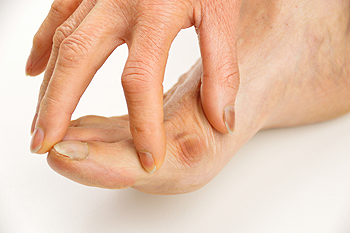Shoes And Genetics May Cause Bunions
Monday, 15 June 2020 00:00 A common reason patients may develop bunions can be from the shoes that are frequently worn. Many shoes have inadequate room for the toes to move freely in, which may cause the bone on the side of the big toe to protrude. Additionally, research has indicated that genetics may play a significant role in the development of a bunion. The bunion may cause the shape of the foot to change, and larger shoes may have to be purchased. An existing bunion can cause the inability to bend or strengthen the big toe, and it may become red and swollen. If you are afflicted with a bunion, it is advised that you consult with a podiatrist who can offer the best treatment for you.
A common reason patients may develop bunions can be from the shoes that are frequently worn. Many shoes have inadequate room for the toes to move freely in, which may cause the bone on the side of the big toe to protrude. Additionally, research has indicated that genetics may play a significant role in the development of a bunion. The bunion may cause the shape of the foot to change, and larger shoes may have to be purchased. An existing bunion can cause the inability to bend or strengthen the big toe, and it may become red and swollen. If you are afflicted with a bunion, it is advised that you consult with a podiatrist who can offer the best treatment for you.
If you are suffering from bunion pain, contact Joseph D. Ruffo, DPM, PC of New York. Our doctor can provide the care you need to keep you pain-free and on your feet.
What Is a Bunion?
Bunions are painful bony bumps that usually develop on the inside of the foot at the joint of the big toe. As the deformity increases over time, it may become painful to walk and wear shoes. Women are more likely to exacerbate existing bunions since they often wear tight, narrow shoes that shift their toes together. Bunion pain can be relieved by wearing wider shoes with enough room for the toes.
Causes
- Genetics – some people inherit feet that are more prone to bunion development
- Inflammatory Conditions - rheumatoid arthritis and polio may cause bunion development
Symptoms
- Redness and inflammation
- Pain and tenderness
- Callus or corns on the bump
- Restricted motion in the big toe
In order to diagnose your bunion, your podiatrist may ask about your medical history, symptoms, and general health. Your doctor might also order an x-ray to take a closer look at your feet. Nonsurgical treatment options include orthotics, padding, icing, changes in footwear, and medication. If nonsurgical treatments don’t alleviate your bunion pain, surgery may be necessary.
If you have any questions, please feel free to contact one of our offices located in Sea Cliff and Babylon, NY . We offer the newest diagnostic and treatment technologies for all your foot care needs.




